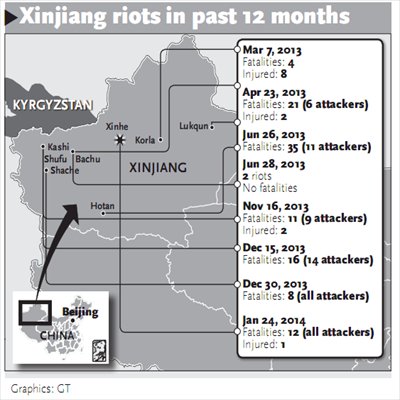

Police in Northwest China's Xinjiang Uyghur Autonomous Region on Friday shot dead six attackers, while another six died in an explosion, local authorities revealed Saturday.
Two explosions took place in a beauty salon and a grocery market in Xinhe county, Aksu prefecture at around 6:40 pm Friday. A group of terrorist suspects threw explosives at police, who were making arrests, and police opened fire and gunned down six, the Xinjiang government announced on its official website ts.cn.
[Related: Police shoot 6 dead, arrest 5 in Xinjiang]
Six other suspects were killed later in an explosion they set off themselves in their vehicle when they were surrounded by police, according to local authorities.
Police have also arrested five suspects. One police officer was slightly injured but no casualties were reported among the public.
A local official told the Global Times on condition of anonymity that a major suspect had been captured, and the group had two female members.
"The suspects in Xinhe were brainwashed by terrorist videos and gathered to orchestrate the attack, just like most previous attacks that have happened in Xinjiang last year," said the official.
Xinhe county is an old town located in southern Xinjiang and is home to 15 ethnic minorities including Uyghur and Kazak.
"I didn't witness the attack and many residents here don't know much about such incidents, probably because the police usually handle them quickly," Jiang Chengcheng, a businessman in Xinhe who originally came from Quanzhou, Fujian Province, told the Global Times.
A local resident who requested anonymity said that social order remained stable after the attack and people are getting used to a higher police presence. Several other residents in Aksu also said that they could sense a growing trend of violent attacks in the last couple of years, but the public could remain calm as information transparency had been improved.
Li Wei, an anti-terrorism expert with the China Institutes of Contemporary International Relations, told the Global Times that China is facing a tougher anti-terrorism challenge as the scale and frequency of attacks have been escalating.
However, Li emphasized that terrorist attacks in Xinjiang are not a problem that is endemic to the region, as almost every attack that took place there recently was linked to overseas influences.
"The increasing terrorist activities around the region, and even on a global scale, have made terrorist members of the East Turkestan Islamic Movement (ETIM) more active," said Li. He noted that the group has had more frequent exchanges of personnel and arms, and is holding exercises under real combat conditions.
Just one day before the Xinhe attack, Kyrgyz troops killed 11 militants near the border with China, according to the Kyrgyz border service.
The masked militants were spotted in Pikertyk, some 40 kilometers from the border, by camp ranger Alexander Barykin, who was killed. All the militants were later killed in a gunfight with border guards after they refused to surrender.
Kyrgyz authorities did not exclude the possibility that they might be Uyghur separatists from Xinjiang.
The Chinese Embassy in Kyrgyzstan said the militants could not be identified until investigations had concluded, and they had been cooperating with the investigation.
A Xinjiang anti-terrorism official told the Global Times that the militants had a thorough plan, as ropes had been found in their belongings, probably to climb the high mountains on the border, and a damaged memory card in their camera indicated their sense of secrecy.
ETIM has been strengthening management in Kyrgyzstan in recent years, recruiting younger members and tightening their hierarchy in a bid to influence Uyghur groups that do not hold separatist tendencies.
With Aksu prefecture just on the other side of the Kyrgyz-Chinese border, a Xinjiang official told the Global Times that although it is not certain that the two attacks were related, it is in the common interests of China and Central Asian countries to fight against terrorism together.
"The border incident is highly threatening and authorities need to pay close attention to the identities of the attackers," said Li, adding that terrorist activities around Chinese borders are shifting from South Asia to Central Asia, which is a springboard for entering Xinjiang.
Both China and Kyrgyzstan are members of the Shanghai Cooperation Organization (SCO), with joint anti-terrorism efforts being imperative to China in fighting separatism, extremism and terrorism. It is also an important link for energy cooperation between China and Central Asian countries.
"The SCO efforts have been effective but terrorists have found ways to get new camps," said Li. He added that Kyrgyzstan has weaker political stability and is easier for terrorists to use as a base to penetrate Xinjiang.
"The intense global terrorism trend makes international cooperation very important, and China has been putting great efforts into anti-terrorism in Xinjiang," Li said.
Uygur teacher involved in separatist activities
A Uygur teacher from Minzu University of China in Beijing formed a separatist group headed by him and undertook separatist activities under the disguise of his identity, police authorities in China's far western Xinjiang region said on Saturday night. >>>
Copyright ©1999-2018
Chinanews.com. All rights reserved.
Reproduction in whole or in part without permission is prohibited.